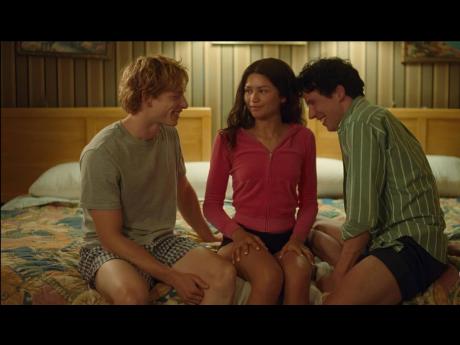‘Challengers’ a techno tennis tryst
It’s long been understood that sex sells. The marketing of Challengers seems to evoke that adage as philosophy. The scandalous love triangle at the centre of the film is touted as the draw for audiences, and for once, the film delivers as advertised. The scenes that are not explicitly about sex are informed by white hot tension among the leads, the three of whom are engaged in a layered game of intimacy that goes on for more than a decade.
It all starts when best friends, or possibly more, Art and Pete both set their sights on young tennis prodigy, Tashi. She may not feel the same way about her suitors, but nevertheless wields her power over them with glee. One fateful night results in a toxic trio, riddled with manipulation, betrayal, and sometimes, tennis. Thankfully for the characters, they have devoted their lives to an intense sport that gives them some catharsis in the face of all their pent-up emotions.
When it comes to said sport, the filmmaking on display is wildly inventive. The camera lobs back and forth slicing its way through the court, taking in the action from the most creative perspectives. One moment the camera becomes the racket, the next the ball, and even under the court, looking up at the players through a transparent floor. You may have seen tennis in a movie, but you’ve never seen it quite like this.
The electric athleticism pairs well with the shock and awe escalation of the three-way relationship, but it’s the score that brings the movie together. Trent Reznor and Atticus Ross give the movie an obtrusive sound that at times is at odds with the dialogue, furthering the feeling of chaos. It’s loud techno music that ups the movie’s already significant intensity, either in a moment of sport, or a stolen glance between the leads.
Ultimately Challengers impresses based on its commitment to telling an over-the-top story about characters who take themselves entirely too seriously. It makes you buy into their conflict, and creates drama out of each passing moment. It keeps from being overwhelming with its fast-paced editing, and the performances from the three leads keep you locked in no matter what time period they portray.
By the end, you feel you know the characters intimately, yet at the same time only knowing what they allowed you to know, keeping a mystery to their personas. It’s a thrill ride with a heart stopper of an ending that will serve as the basis for debate for years to come.
Rating: Big Screen Watch
Damian Levy is a critic and podcaster for Damian Michael Movies

